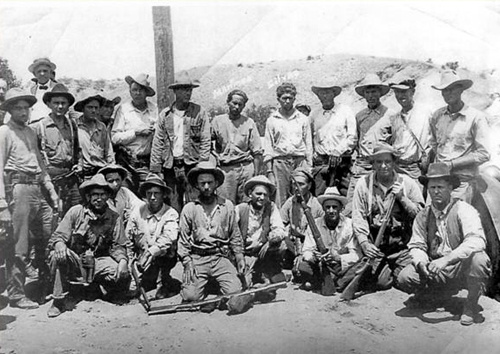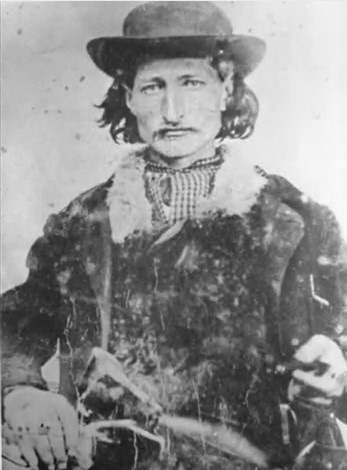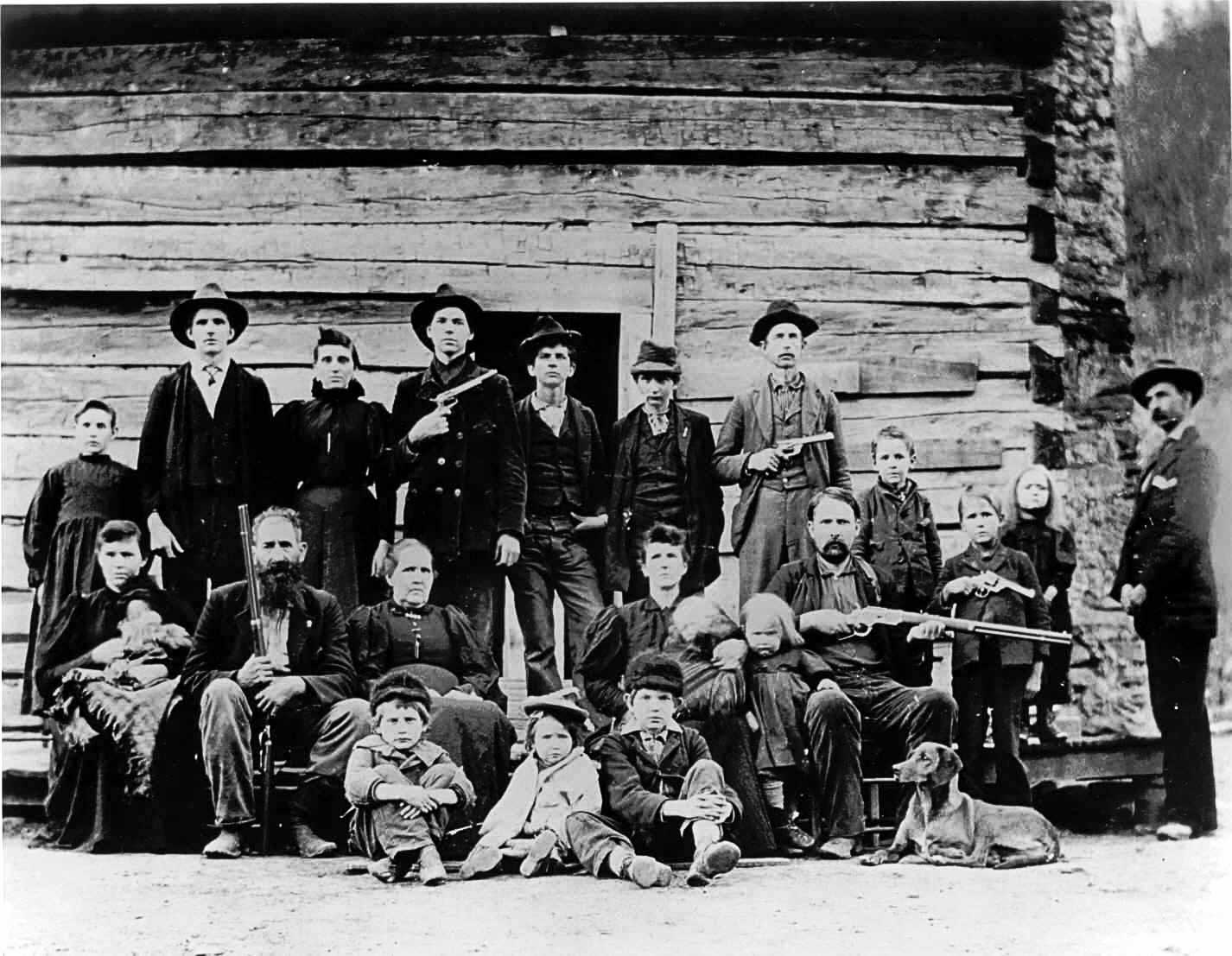|
Tutt–Everett War
The Tutt–Everett War, also called the Marion County War, or the Tutt, King, Everett War, was a politically motivated feud that took place in Marion County, Arkansas between 1844 and 1850 during the politically charged era preceding the American Civil War. Background The feud involved the Tutt family, supporters of the Whig Party, and the Everett family, adherents of the Democratic Party. The Everetts had moved to Arkansas from Kentucky, with John "Sim", Jesse and Bart Everett becoming some of the most influential men in the area. The Tutt family, from Tennessee, was led by Hansford "Hamp" Tutt. They were influential in Searcy County, Arkansas, and were bitterly opposed to dividing Marion and Searcy counties. A third family, the Kings, also became involved, supporting the Tutts as Whig Party backers. Violence first occurred during a political debate in Yellville, Arkansas, which degenerated into an all out brawl. The fighting peaked when Tutt supporter Alfred Burnes struck J ... [...More Info...] [...Related Items...] OR: [Wikipedia] [Google] [Baidu] |
Marion County, Arkansas
Marion County is located in the Ozark Mountains in the U.S. state of Arkansas. The county is named for Francis Marion, the famous "Swamp Fox" of the Revolutionary War. Created as Arkansas's 35th county in 1836, Marion County is home to one incorporated town and four incorporated cities, including Yellville, the county seat. The county is also the site of numerous unincorporated communities and ghost towns. The county included part of what is now Searcy County, Arkansas, with many opposing to dividing them, which helped fueled the bloody Tutt-Everett War between 1844 and 1850. Occupying , Marion County is the 33rd smallest county in Arkansas. As of the 2010 Census, the county's population is 16,653 people in 3,531 households. Based on population, the county is the 27th smallest county of the 75 in Arkansas. Located in the Ozarks, the county is largely covered with rugged terrain and waterways, with the exception of King's Prairie in the southwestern portion. It is drained by ... [...More Info...] [...Related Items...] OR: [Wikipedia] [Google] [Baidu] |
Posse Comitatus (common Law)
The ''posse comitatus'' (from the Latin for "power of the county/community/guard"), frequently shortened to posse, is in common law a group of people mobilized by the conservator of peace – typically a reeve, sheriff, chief, or another special/regional designee like an officer of the peace potentially accompanied by or with the direction of a justice or ajudged parajudicial process given imminence of actual damage – to suppress lawlessness, defend the people, or otherwise protect the place, property, and public welfare (see also ethical law enforcement (police by consent etc.)). The ''posse comitatus'' as an English jurisprudentially defined doctrine dates back to ninth-century England and the campaigns of Alfred the Great (and before in ancient custom and law of locally martialed forces) simultaneous thereafter with the officiation of sheriff nomination to keep the regnant peace (known as " the queen/king's peace")Justus Caususis everpresently necessary in establishing, f ... [...More Info...] [...Related Items...] OR: [Wikipedia] [Google] [Baidu] |
Old West
The American frontier, also known as the Old West or the Wild West, encompasses the geography, history, folklore, and culture associated with the forward wave of American expansion in mainland North America that began with European colonial settlements in the early 17th century and ended with the admission of the last few western territories as states in 1912 (except Alaska, which was not admitted into the Union until 1959). This era of massive migration and settlement was particularly encouraged by President Thomas Jefferson following the Louisiana Purchase, giving rise to the expansionist attitude known as "Manifest Destiny" and the historians' " Frontier Thesis". The legends, historical events and folklore of the American frontier have embedded themselves into United States culture so much so that the Old West, and the Western genre of media specifically, has become one of the defining periods of American national identity. The archetypical Old West period is generally ac ... [...More Info...] [...Related Items...] OR: [Wikipedia] [Google] [Baidu] |
Wild Bill Hickok – Davis Tutt Shootout
Wild, wild, wilds or wild may refer to: Common meanings * Wild animal * Wilderness, a wild natural environment * Wildness, the quality of being wild or untamed Art, media and entertainment Film and television * ''Wild'' (2014 film), a 2014 American film from the 2012 book * ''Wild'' (2016 film), a 2016 German film * ''The Wild'', a 2006 Disney 3D animation film * ''Wild'' (TV series), a 2006 American documentary television series * The Wilds (TV series), a 2020 fictional television series Literature * '' Wild: From Lost to Found on the Pacific Crest Trail'' a 2012 non-fiction book by Cheryl Strayed * ''Wild, An elemental Journey'', a 2006 autobiographical book by Jay Griffiths * ''The Wild'' (novel), a 1991 novel by Whitley Strieber * ''The Wild'', a science fiction novel by David Zindell * ''The Wilds'', a 1998 limited-edition horror novel by Richard Laymon Music * ''Wild'' (band), a five-piece classical female group Albums and EPs * ''Wild'' (EP), 2015 * ''Wild'', a ... [...More Info...] [...Related Items...] OR: [Wikipedia] [Google] [Baidu] |
Wild Bill Hickok
James Butler Hickok (May 27, 1837August 2, 1876), better known as "Wild Bill" Hickok, was a folk hero of the American Old West known for his life on the frontier as a soldier, scout, lawman, gambler, showman, and actor, and for his involvement in many famous gunfights. He earned a great deal of notoriety in his own time, much of it bolstered by the many outlandish and often fabricated tales he told about himself. Some contemporaneous reports of his exploits are known to be fictitious, but they remain the basis of much of his fame and reputation. Hickok was born and raised on a farm in northern Illinois at a time when lawlessness and vigilante activity were rampant because of the influence of the "Banditti of the Prairie". Drawn to this ruffian lifestyle, he headed west at age 18 as a fugitive from justice, working as a stagecoach driver and later as a lawman in the frontier territories of Kansas and Nebraska. He fought and spied for the Union Army during the American Civil War ... [...More Info...] [...Related Items...] OR: [Wikipedia] [Google] [Baidu] |
Confederate Army
The Confederate States Army, also called the Confederate Army or the Southern Army, was the military land force of the Confederate States of America (commonly referred to as the Confederacy) during the American Civil War (1861–1865), fighting against the United States forces to win the independence of the Southern states and uphold the institution of slavery. On February 28, 1861, the Provisional Confederate Congress established a provisional volunteer army and gave control over military operations and authority for mustering state forces and volunteers to the newly chosen Confederate president, Jefferson Davis. Davis was a graduate of the U.S. Military Academy, and colonel of a volunteer regiment during the Mexican–American War. He had also been a United States senator from Mississippi and U.S. Secretary of War under President Franklin Pierce. On March 1, 1861, on behalf of the Confederate government, Davis assumed control of the military situation at Charleston, South ... [...More Info...] [...Related Items...] OR: [Wikipedia] [Google] [Baidu] |
Hot Springs, Arkansas
Hot Springs is a resort city in the state of Arkansas and the county seat of Garland County. The city is located in the Ouachita Mountains among the U.S. Interior Highlands, and is set among several natural hot springs for which the city is named. As of the 2020 United States Census, the city had a population of 37,930. The center of Hot Springs is the oldest federal reserve in the United States, today preserved as Hot Springs National Park. The hot spring water has been popularly believed for centuries to possess healing properties, and was a subject of legend among several Native American tribes. Following federal protection in 1832, the city developed into a successful spa town. Incorporated January 10, 1851, the city has been home to Major League Baseball spring training, illegal gambling, speakeasies and gangsters such as Al Capone, horse racing at Oaklawn Park, the Army and Navy Hospital, and 42nd President Bill Clinton. One of the largest Pentecostal denominations in ... [...More Info...] [...Related Items...] OR: [Wikipedia] [Google] [Baidu] |
List Of Feuds In The United States
Feuds in the United States deals with the phenomena of historic blood feuding in the United States. These feuds have been numerous and some became quite vicious. Often, a conflict which may have started out as a rivalry between two individuals or families became further escalated into a clan-wide feud or a range war, involving dozens—or even hundreds—of participants. Below are listed some of the most notable blood feuds in United States history, most of which occurred in the Old West. Early–Hasley A family feud that took place immediately following the American Civil War, in Bell County, Texas from 1865 to 1869, the Early and Hasley families and their allies found themselves extending the ideological battle of that recent conflict. John Early, a supporter of the federal officials then occupying Texas, was an early member of the Texas Home Guard. He was having repeated run-ins with Drew Hasley, an older local citizen who had been a staunch Confederacy backer. When Hasl ... [...More Info...] [...Related Items...] OR: [Wikipedia] [Google] [Baidu] |
Carroll County, Arkansas
Carroll County is a county located in the U.S. state of Arkansas. As of the 2020 census, the population was 28,260. The county has two county seats, Berryville and Eureka Springs. Carroll County is Arkansas's 26th county, formed on November 1, 1833, and named after Charles Carroll, the last surviving signer of the United States Declaration of Independence. Geography According to the U.S. Census Bureau, the county has a total area of , of which is land and (1.4%) is water. Major highways * U.S. Highway 62 * U.S. Route 62 Spur * U.S. Highway 412 * Arkansas Highway 21 * Arkansas Highway 23 * Arkansas Highway 103 * Arkansas Highway 143 * Arkansas Highway 187 * Arkansas Highway 221 * Arkansas Highway 311 * Arkansas Highway 980 Adjacent counties * Stone County, Missouri (north) * Taney County, Missouri (northeast) * Boone County (east) * Newton County (southeast) * Madison County (south) * Benton County (west) * Barry County, Missouri (northwest) Demographics 2020 cens ... [...More Info...] [...Related Items...] OR: [Wikipedia] [Google] [Baidu] |
Militia
A militia () is generally an army or some other fighting organization of non-professional soldiers, citizens of a country, or subjects of a state, who may perform military service during a time of need, as opposed to a professional force of regular, full-time military personnel; or, historically, to members of a warrior-nobility class (e.g. knights or samurai). Generally unable to hold ground against regular forces, militias commonly support regular troops by skirmishing, holding fortifications, or conducting irregular warfare, instead of undertaking offensive campaigns by themselves. Local civilian laws often limit militias to serve only in their home region, and to serve only for a limited time; this further reduces their use in long military campaigns. Beginning in the late 20th century, some militias (in particular officially recognized and sanctioned militias of a government) act as professional forces, while still being "part-time" or "on-call" organizations. For instan ... [...More Info...] [...Related Items...] OR: [Wikipedia] [Google] [Baidu] |
Thomas Stevenson Drew
Thomas Stevenson Drew (August 25, 1802 – January 1879) was the third Governor of the U.S. state of Arkansas. Biography He was born in Wilson County, Tennessee. Drew moved with his family to Louisiana and then, in 1818, to Arkansas. He worked as a traveling salesman and school teacher. Drew first settled in Clark County and was appointed Clark County Clerk in 1823. In 1827 he moved to Pocahontas, Arkansas, and married Cinderella Bettis, daughter of the prosperous founder of that town, Ransom Bettis. His father-in-law gave the newlyweds of bottom land in Cherokee Bay, where the town of Biggers lies in what is now Randolph County (then Lawrence County.) The Drews prospered, and their plantation included 20 African-American slaves. In 1832, Drew was elected County Judge of Lawrence County. In 1835, Drew and Bettis convinced the Arkansas Territorial Legislature to create Randolph County out of Lawrence County. In 1836, Drew and Bettis held an infamous free bar-b-que comp ... [...More Info...] [...Related Items...] OR: [Wikipedia] [Google] [Baidu] |





